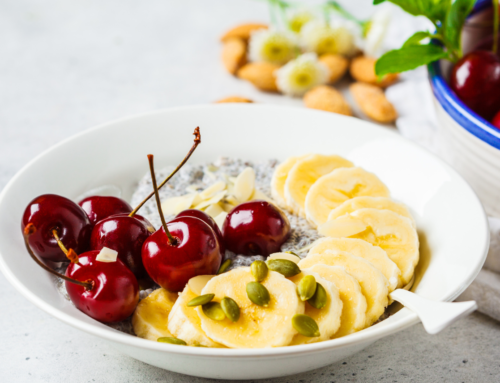In the current world we live in, many of us are under constant stress and sleep problems are wide-spread. In addition to stress impacting sleep quality, it can alter diversity in the gut microbial population and increase gut permeability.
What is the gut microbiome?
Our gut microbiome, or microbiota, is a dense and diverse population that includes bacteria, viruses, fungi, and more, with bacteria dominating. Our colon has more than 1000 different microbial species. The diversity of the gut microbiota – or the variety of different bacteria residing in the gut – is directly correlated to human health. Our microbiota protect us against pathogenic microbes, modulate the immune system, produce essential metabolites and nourish gastrointestinal cells.
The role of prebiotics.
Prebiotics provide food for the ‘friendly’ or ‘good’ bacteria in our gut which in turn produce metabolites that have a beneficial effect on our health and sleep. If we do not eat enough prebiotic foods we essentially starve our good bacteria, and rob ourselves of quality sleep and optimal health. New research reveals a diet containing prebiotics enhances sleep quality through beneficial changes in the gut bacteria and reduces the impact of stress on sleep and circadian health.
In the study, rats fed a prebiotic-rich diet were buffered against the negative effects of stress on the gut microbiome. They also spent more time in deep sleep while consuming the prebiotics, and after exposure to stress they spent more time in REM sleep which is critical for mental restoration and processing of the stress. An earlier study had the same outcome, with a diet high in prebiotics favourably altering the gut bacteria and reducing the negative effects of stress. Specifically, the prebiotics were able to protect against stress-induced changes in the gut microbiome and alterations to sleep and the circadian rhythm.
In infants, those receiving formula with an added prebiotic blend demonstrated faster development of the sleep-wake cycle and shorter episodes of crying at a time point corresponding to the same age and development where crying peaks.
In addition to aiding sleep, eating a diverse range of prebiotics fosters the growth of a diverse range of gut bacteria. Diversity in the gut microbial community is associated with more total sleep time and less waking after sleep onset. This suggests diversity of the gut microbiome promotes more and a healthier sleep.
All of this research points to the need to keep our gut microbes healthy and well fed. Unfortunately the Western diet is high in sugar, saturated fat, meat protein, emulsifiers and additives which feeds and leads to the dominance of gut bacteria that promote disease. The presence of specific strains of bacteria that are not beneficial for health have been linked to a poorer sleep too. Neither the cells in our bodies, nor the trillions of microbes living inside us can function properly on nutritionally-deficient over-processed foods. In contrast a diet rich in fruit and vegetables, fibre and prebiotics and omega-3 fatty acids feeds the good gut bacteria which in turn promote better sleep and health.
Consuming prebiotic foods plays a big role in keeping our microbiome healthy and our sleep robust while buffering against the negative effects of stress. To consume more prebiotics in our diet we can look to the following foods. We should aim to include foods from as many of the prebiotic families (provided in the image below) as possible each day. Eating more variety will promote greater diversity of good gut bacteria, and as we have seen in the above research diversity improves sleep quality.

Simple dietary and lifestyle modifications can have a huge impact on not only gut health but also sleep. We all need quality sleep and resilience to stress right now and adding prebiotics to our diet is one way to help.
Having trouble getting the kids to eat prebiotics?
This short video may help inspire the older kiddo to eat more foods that nourish the good gut bacteria.
Disclaimer
For educational purposes only. If you suspect you have a medical problem, please see a physician.
All the links in this blog are completely unsponsored and contain no affiliate payments.






Leave A Comment